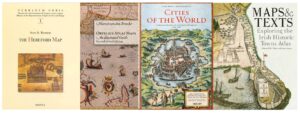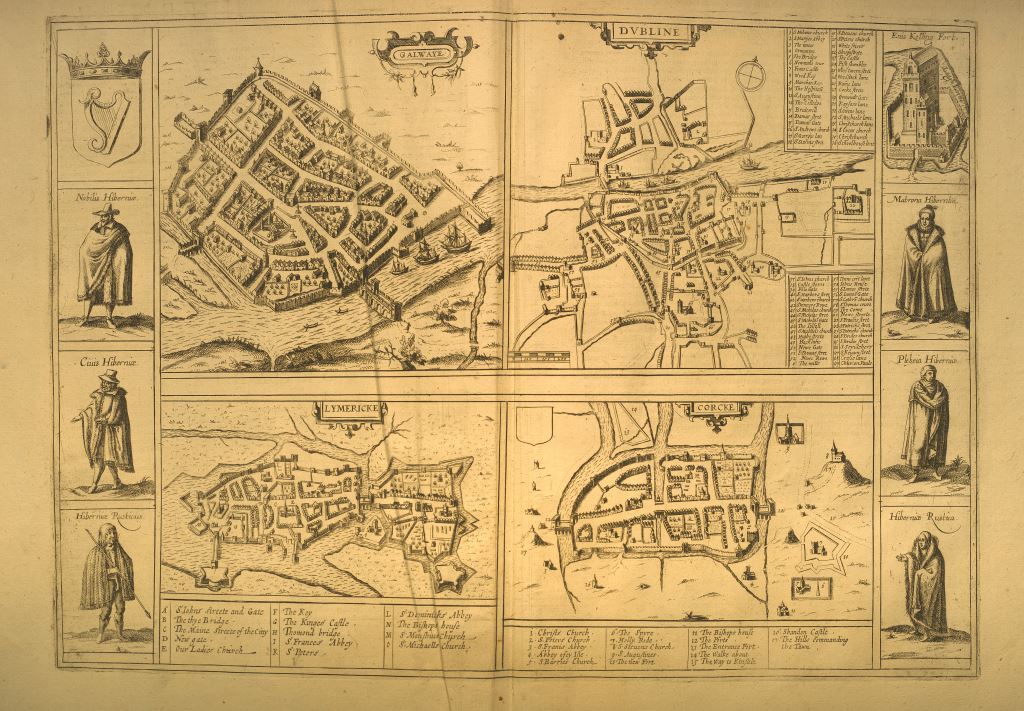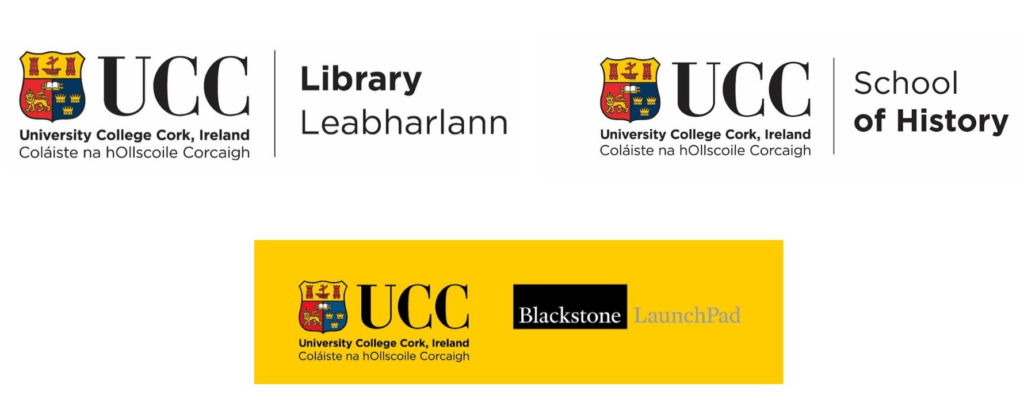Mapping Cork: Trade, Culture and Politics in Late Medieval and Early Modern Ireland / Introduction
- Elaine Harrington
- May 18, 2020
Student Exhibition, MA in Medieval History
Introduction: MA in Medieval History, HI6091 Module and Special Collections at University College Cork
Special Collections is delighted to welcome the School of History students engaging with our collections through a series of online exhibitions. UCC Library’s Special Collections holds a variety of early modern maps of Cork city and county such the Civitates Orbis Terrarum (1576-1618) (volume six published in 1618 contains maps of Irish cities). In addition, Special Collections holds maps in print, in facsimile, in critical editions, in limited editions, in illustrated guides, in atlases and reference sources including:

- John Lindsay’s Map of Cork Harbour (1759);
- William Beauford’s Map of Cork (1801);
- Taschen’s 2011 facsimile of Civitates Orbis terrarum = Cities of the World; original edition published 1675-1618;
- Terrarum orbis series which includes a critical edition of the The Hereford Map, original c. 1300;
- Edward Lynam’s The First Engraved Atlas of the World: The Cosmographia of Claudius Ptolemaeus, Bologna, 1477, 200 copies were printed of which this is #58. In addition, this item is inscribed by Lynam “To University College Cork, from Edward Lynam, September 1942”;
- An illustrated guide to the atlas The Ortelius Atlas Maps (2011), original Latin edition published in 1570;
- Irish Historic Towns Atlas series (1986 – present).

This online exhibition, which uses the Civitates map of Cork as a starting point, is presented as a series of blog posts and celebrates the ongoing collaboration between UCC’s Special Collections and the School of History’s MA in Medieval History. History students, at both undergraduate and postgraduate levels, who visit Special Collections receive specialised support and access to stimulating rare publications and materials of historical value. These students develop key skills including communication, teamwork and archival intelligence: the practical skills to locate and use special collections material, and artefactual skills: the ability to identify and analyse primary sources. Acquisition of this skill set leads them to a deeper understanding of the artefact far beyond that acquired from modern text reprints.

Special Collections represent research facilities that provide specialised support and access to stimulating resources. In their second and third years, UCC History undergraduate students are introduced to Special Collections as part of their various modules when they get an opportunity to work with rare publications and material of historical value. These undergraduate classes always leave the students animated by a space they usually do not frequent during the course of their studies, by the content of the material that is brought out especially for them and by the kindness and helpfulness of staff.
The initial encounter of undergraduates with Special Collections continues through their postgraduate studies. The MA in Medieval History students in the past three years have availed of an exciting and rare opportunity of being on work placements in Special Collections. They have created online exhibitions inspired by rare books and facsimiles housed by Special Collections as part of the HI6091 Skills for Medieval Historians module; these exhibitions include: The Luttrell Psalter, The Book of Kells and Viking Cork.
This blog centres on the themes of urban and national identity with a particular focus on Cork city as a centre of trade, culture and politics; all of these themes reflect the research interests of the current MA students, with the images and texts selected by the students themselves to illustrate these themes. Using the Civitates map of Cork, this project is yet another outcome of collaboration between the librarians, academics and students. It represents a collaboration that continues to stimulate all involved and through the online output reaches beyond the walls of UCC. More importantly, the project has been completed during the COVID-19 crisis and its completion is a great testimony to the value of teamwork and collegiality, and the commitment of the MA students to produce high quality research during challenging times.

Students
Andrew Neville completed his undergraduate studies in History and History of Art at University College Cork. He was awarded the Jennifer O’Reilly Prize in Medieval History, 2020, for his work on the representations of Reginald FitzUrse in medieval treatments of the murder scenes of Thomas Becket. His primary research interests are medieval artistic culture, medieval warfare and cosmology. His MA thesis focuses on the medieval French perceptions of the Irish during Richard II’s campaign in Ireland. Andrew is also interested in the relationship between medieval colour theory and geographical symbolism, and the narratives of Irish barbarity and English civility.
Emmanuel Alden earned his BA in History at Kutzown University, Pennsylvania, in 2018. His undergraduate work focused on European history, studying the events which led to the Second World War during the late nineteenth and early twentieth centuries, in addition to studies on the Reformation and Crusades. His undergraduate dissertation was on the historiography of the Viking Age, and his current historical interests lie in the Viking Age, and the connections between the Celtic and Nordic peoples. His MA thesis examines how the medieval Irish portrayed the Hiberno-Norse Viking population in Ireland in the late Viking Age, with an emphasis on the names and phrases used when describing them.
Patrick McKee completed his undergraduate degree in History and English at University College Cork. His final year History dissertation looked at the Christian-Muslim encounters in the thirteenth and fourteenth centuries. Before his UCC studies, Patrick served as a senior NCO in the Irish military. Patrick’s main historical interests lie in medieval Christianity and medieval Christian mysticism. His MA in Medieval History dissertation focuses on the Church of the Holy Sepulchre in Jerusalem and its depiction in pilgrimage accounts from the fourth to the fourteenth century.
David O’Mahony completed his undergraduate studies in History and Geography at University College Cork. David’s undergraduate History dissertation looked at the bardic influences on politics in early modern Ireland. David’s interest in medieval music is inspired by his own musical background and experience in composing and performing music. His MA thesis focuses on the unique musicianship of medieval Irish harpers and poetic skills of the bardic class. It compares their exceptional skills to the continental approaches to music and performance arts. The thesis also looks at medieval Icelandic music culture as a means of comparing two insular places.
The project has been overseen by Elaine Harrington and Dr Małgorzata Krasnodębska-D’Aughton.
Elaine Harrington is UCC Library’s Special Collections Assistant Librarian. Elaine raises the profile of UCC Library’s Special Collections with local, national and international engagement through classes, social media, exhibitions, events, outreach and broadcasting. She collaborates with 30 academics in UCC and CIT to develop innovative research-led undergraduate and postgraduate modules based on primary sources held in UCC Library’s Special Collections. Elaine is a co-founder of the Sonic Histories of Cork City (SHOCC) Project and the Chair of CONUL’s sub-group for Unique & Distinct Collections.
Dr Małgorzata Krasnodębska-D’Aughton is Senior Lecturer at UCC’s School of History. She has published on Irish illuminated manuscripts, manuscripts in Polish libraries, and most recently, on the Irish mendicant orders. She is interested in the intersections between History and other disciplines, History and the arts, and History and students’ skills and employability. Her professional experience includes work on the Franciscan Faith: Sacred Art in Ireland 1600-1750 exhibition as well as the Medieval Ireland exhibition, both on permanent display at the National Museum of Ireland. She collaborates on the Monastic Ireland Project that provides a platform for academic studies on monasticism, combined with heritage and education outputs. She has contributed to programmes on RTÉ’s Lyric FM titled ‘Friars Walk’ (December 2016), ‘Jerusalem Passion’ (April 2017, finalist at the New York Festivals: World’s Best Radio Programs, June 2018) and ‘Christmas Postcards’ (December 2017). She is a co-editor of Monastic Europe: Community, Landscape and Settlement (Brepols, 2019).
Acknowledgements
We wish to acknowledge the generosity of the National Library of Ireland, Trinity College Dublin’s Digital Collections, the Cork Historical and Archaeological Society, the Library of Congress and the University of Utrecht for allowing us to use their images of MS 700, the Hardiman Atlas, Blackrock Castle and both editions of Civitiates Orbis Terrarum respectively. We thank Dr Hiram Morgan and Dr Diarmuid Scully for their comments and advice on the text of the blog, and Peter Finnegan for his talk on the Blackstone Launchpad facilities available to postgraduate students. The students of the MA in Medieval History programme wish to convey their gratitude to Dr Małgorzata Krasnodębska-D’Aughton, coordinator of the HI6091 Skills for Medieval Historians module, and Elaine Harrington, Special Collections Librarian, for their support throughout the editing process of this blog.
Małgorzata Krasnodębska-D’Aughton & Elaine Harrington

Twitter: School of History, UCC |Special Collections, UCC Library | College & Arts & Social Sciences, UCC | Małgorzata Krasnodębska-D’Aughton
Facebook: School of History, UCC

